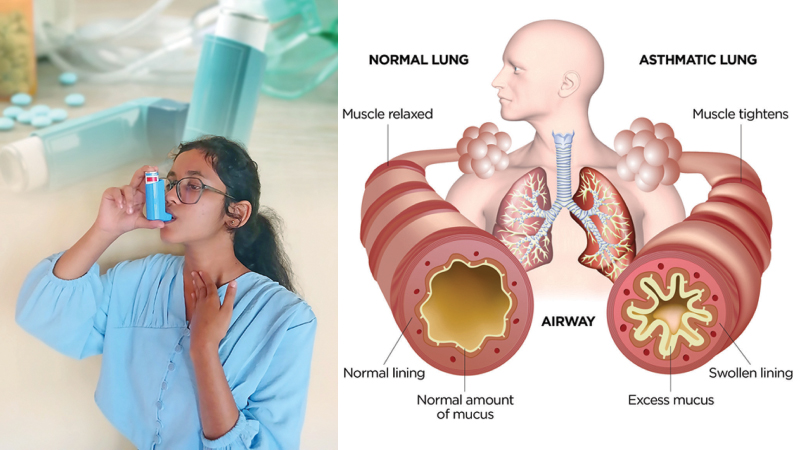 Judging from recent global statistics the world seems to be on the brink of an Asthma epidemic. Sri Lanka is no exception. Climatic changes, air pollution from vehicular emissions, overcrowded ill ventilated houses in urban areas, and tobacco smoking are some of the leading contributory factors that have driven this condition in the past decade or so in Sri Lanka especially. While Asthma is one of the most common non communicable diseases, many who even have the disease don’t know how it is caused, what triggers it, and its serious impacts on the human body as whole, if treatment is not sought in time. The Sunday Observer spoke to the Senior Registrar National Chest hospital Welisara Dr. Nilanthi Gunathilaka to give us more insights into this condition.
Judging from recent global statistics the world seems to be on the brink of an Asthma epidemic. Sri Lanka is no exception. Climatic changes, air pollution from vehicular emissions, overcrowded ill ventilated houses in urban areas, and tobacco smoking are some of the leading contributory factors that have driven this condition in the past decade or so in Sri Lanka especially. While Asthma is one of the most common non communicable diseases, many who even have the disease don’t know how it is caused, what triggers it, and its serious impacts on the human body as whole, if treatment is not sought in time. The Sunday Observer spoke to the Senior Registrar National Chest hospital Welisara Dr. Nilanthi Gunathilaka to give us more insights into this condition.
Excerpts
Q. World Asthma Day falls on May 7 this year as a collaborative effort of Asthma healthcare workers and the World Health Organization (WHO) since 1993. Why is a special day set aside for this comparatively mild condition amid so many other urgent health issues?
A. It is because Asthma is a common non-communicable disease among all age groups with a high world prevalence of more than 260 million cases. It imposes a significant health impact especially on low and middle income countries causing 4.5 million deaths each year.

Dr. Nilanthi Gunathilaka
Most of these deaths are due to a lack of proper awareness of the disease. Therefore, it is timely and justifiable to allocate a special day to improve the knowledge and fill the gaps on this seemingly mild but fatal disease. Hence this year World Asthma Day focuses on empowering people with education on asthma to manage their disease and to recognise when to seek medical help.
Q. For the benefit of readers with limited knowledge of this condition tell us what exactly is Asthma?
A. Asthma is a chronic disease where small airways in our lungs are affected. Small airways are narrowed due to transient contractions of smooth muscles and hyper-responsiveness and increased phlegm production inside. Due to the above three reasons, airways get blocked and the patient feels difficulty in breathing the air out of the lungs.
Q. How is it caused? Are there several causes that trigger an attack?
A. There is a reversible airflow limitation due to the three mechanisms which I explained above. Genetic, environmental and respiratory infections are the common triggers of asthma attacks.
Q. Do they vary from person to person?
A. Yes. Asthma triggers vary from person to person. Exposure to cold air, active or passive smoking, air pollutants, house dust mite, exercise and emotions are well known to trigger asthma attacks. One can also get asthma following viral respiratory tract infections as well.
Q. Who are those most at risk of developing Asthma?
A. Generally anyone can get asthma. Children have more propensity than adults to develop asthma due to various reasons such as immature airways and maternal exposure to various toxins and risk factors during their fetal life.
Males under the age of 20 years have higher risk of getting asthma than females due to relatively narrowed airways in males. In the age group 20 to 40 years both genders have equal risk whereas after 40 years it is females who are high in numbers.
Q. What about the genetic factor? For example, if a person has a family history of asthma what are the chances he/she will also develop asthma?
A. Yes, if so, the risk of developing asthma is high in that person. Asthma is a disease which passes down through your family where your genetics play a complex role. A myriad of genes have been identified for the causation, affecting the severity and the response to the asthma treatment as well.
Q. Is it contagious?
A. No. It is like any other non-communicable disease.
Q. Is it curable? Or at least reversed if treated early?
A. There is no permanent cure for asthma. But it doesn’t mean that one should suffer from the disease. If diagnosed early and started on proper treatment, it can be controlled and deaths due to asthma can be prevented.
Q. Inhaler use is now being promoted by health care workers as an effective way of managing the condition. How do we know what kind of inhaler will best suit us?
A. You should meet the doctor in the asthma clinic of your hospital. He will accurately diagnose and provide you the proper inhaler device and moreover will teach you the inhaler technique as well. Government hospitals do provide most of the inhalers.
Q. What are the most common symptoms associated with Asthma?
A. Coughing, wheezing, difficulty in breathing and chest tightness are the four cardinal symptoms of asthma.
Q. Research has found that some asthma sufferers experience these symptoms when they laugh or cry.
A. Yes, strong emotions such as anger and laughter do play a role in triggering asthma.
Q. So what can a person prone to asthma do to reduce these attacks? Will changing their lifestyles help?
A. As the triggering factors are individually varying, one should identify the culprit triggers and try to avoid them to prevent asthma flare-ups.
Q. Can stress bring on an attack?
A. Stress is a common asthma trigger and it has shown in research that patients who are under stress have poor asthma control and increased flare-ups of the disease.
Q. Does having a pre-condition like diabetes and obesity also lead to asthma? If so, how?
A. Yes, the above diseases have a bidirectional relationship with asthma. Especially diabetes and obesity are known to be risk factors for asthma due to associated airway inflammation. Conversely, asthma may increase the risk of developing obesity and diabetes as well.
Q. Smoking has been cited as a leading cause for triggering asthma. What is the impact of smoking on human health as a whole?
A. Active or passive cigarette smoking is bad for the lung health as cigarettes contain thousands of chemicals and hundreds of them are toxic to your lungs and several are found to cause lung cancers as well. Substances in smoke deposit in small airways and damage the mucous lining inside.
Q. Drinking alcohol regularly can worsen asthma attacks. Do you agree?
A. A lot of research is currently under way on this and studies have found that alcohol can worsen symptoms and trigger asthma attacks.
Q. What about the food we eat? Can a person develop asthma if he or she is allergic to a certain food? Any Do’s and Don’ts on this?
A. No need to restrict your foods or eating habits due to the fear of developing asthma. Should a person have an allergy for a particular food which can trigger an asthma attack he or she should avoid that particular food.
Q. Will exercise help to minimise the impacts of asthma?
A. Actually exercise is a trigger for asthma in some people which is called exercise- induced- bronchoconstriction (EIB). Generally however, exercise is good for your heart and physical fitness which will invariably improve your breathing. Breathing exercises which include yoga and meditation can be helpful but we need to have more clear evidence of their benefits.
Q. How is asthma diagnosed and who can make the diagnosis? Does it require a hospital setting?
A. Not necessarily. Asthma can be diagnosed even as an out-patient setting.
Usually the diagnosis is guided by symptoms such as cough, wheezing, difficulty in breathing or chest tightness. One can have one or several of those symptoms with or without diurnal variation. That means your symptoms can worsen in the night or early morning. Diagnosis is confirmed with a test called spirometer test which is available in most of the respiratory units and some private sector institutions as well.
Q. What is the treatment? Drugs? Inhalers? If inhalers are recommended, are they customised to suit each patient depending on his/her age, health status etc.?
A. Yes the inhaler medications are customised for each patient. We prescribe steroid containing inhalers as used as the controllers of the disease. Salbutamol containing inhalers are used as relievers to alleviate asthma symptoms especially while having acute symptoms of asthma. Inhaler devices containing drugs as aerosols are the ideal mode of treatment for treating asthma as it delivers the drugs to your airways directly.
Q. The theme for World Asthma Day this year is “Uncovering Asthma misconceptions”. So tell us what kind of myths are most common in Sri Lanka regarding Asthma?
A. A serious myth is that use of inhaler treatment is habit forming, dangerous and loses its effectiveness over time.Hence I wish to reiterate that inhalers are not habit forming. They are safe and will keep the disease under control if they are used in the correct way as they are prescribed.
Other myths include the following: Some patients are reluctant to use steroid-containing inhalers due to various reasons such as fear of weight gain and developing diabetes.
Steroid inhaler contains only a small amount of drug and it is the medication which controls your disease in the long run. Unlike oral steroids tablets, inhalers do not impose a significant effect on your blood sugar or other systems of your body.
Then there are myths regarding exercise and sports. Some parents restrict their children or themselves out of exercises and sports due to the fear of asthma. But, people with asthma should participate in the above activities as any other person without asthma would do.
Q. According to your latest data which region and districts in Sri Lanka is Asthma most prevalent? Why?
A. People living in urban areas where air pollution is high are at a highest risk.Drastic climate change can also impose an additional burden on asthmatics.
Q. World Asthma Day is commemorated by the Global Initiative for Asthma (G I N A) since 1993. Yet it still remains a serious global threat both abroad and in Sri Lanka. So what does the Sri Lanka College of Pulmonologists do to raise more awareness and reduce its incidence in the country?
A. Uplifting public awareness through educational programs islandwide and various other CME programs for doctors and healthcare workers to improve the knowledge of asthma.
Q. Do you have a message to give all Asthma patients out there and those who lead risky lives that drive the disease?
A. Asthma is a completely controllable disease through proper medications and avoidance of triggers as much as possible. As it is a chronic disease, long-term treatment is of utmost importance to maintain a life free of asthma. Patients should not be afraid to use their inhalers as medications are quite safe. If one can control the disease, he or she can live an active good quality life.






